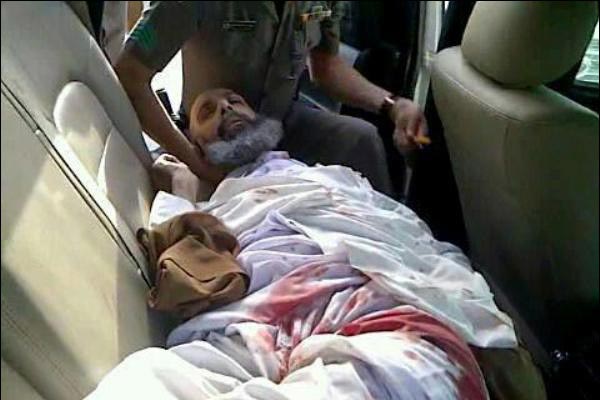
Saudi: Sheikh Nimr’s Crucified Fate

Al-Akhbar daily
Saturday, March 30, 2013
On 25 March 2013, at the first court hearing of prominent cleric Sheikh Nimr al-Nimr, a Saudi prosecutor called for "death by crucifixion." The prosecutor invoked haraba, a form of punishment enforced by the Saudi government, involving crucifixion and dismemberment.
 The cleric's brother, Mohamed al-Nimr, told al-Akhbar daily that the court had convened unexpectedly. He believed the timing to be suspicious, given the mounting protests in Saudi by families of detained Islamists.
The cleric's brother, Mohamed al-Nimr, told al-Akhbar daily that the court had convened unexpectedly. He believed the timing to be suspicious, given the mounting protests in Saudi by families of detained Islamists.
Mohamed, a Saudi businessman who often travels to Beirut, said that the Saudi government's claim about uncovering an Iran-linked spy ring is a diversion from the persistent calls for reform. The government continues to distract by asserting that the kingdom is facing bigger enemies and threats, namely, Iran and the Shia.
Concerning the prosecution's push for sentencing his brother to crucifixion, Mohamed said that the penalty is generally accepted in the kingdom and is stipulated in Islamic law as the harshest form of capital punishment.
Concerning the prosecution's push for sentencing his brother to crucifixion, Mohamed said that the penalty is generally accepted in the kingdom and is stipulated in Islamic law as the harshest form of capital punishment.
The death penalty in Saudi Arabia can take the form of beheading by sword, a firing squad, or less frequently, crucifixion. According to Mohamed, the haraba punishment is usually reserved for those who cause "great mischief in the land."
Saudi media reported that the prosecution accused Nimr of "inciting sectarian strife," "aiding terrorists," and "insulting Gulf leaders and scholars." According to Rasid.com, a Saudi news website, Nimr asked for more time to respond to accusations and appoint a defense lawyer.
Mohamed al-Nimr said that Monday's hearing was intended for the prosecution to state its charges. He also pointed out that Sheikh Nimr declined to speak during the court session, opting not to give any statements except in the presence of a lawyer, a request that the judge accepted. The next hearing is set for April 9.
Mohamed warned that any conviction against the cleric, including a death sentence or otherwise, could have unpredictable consequences.
Nimr was arrested and released for the first time in May 2006, upon his return from Bahrain. Nimr was detained again in August 2008, after Saad al-Faqih, the exiled Saudi dissident, claimed that Saudi authorities feared Nimr because he was backed by Iran. Nimr was released hours later.
Then, on 8 July 2012, he was arrested after organizing a petition demanding the Saudi government recognize the Shia faith and reform educational curricula to remove derogatory mentions of Shias.
After that, Nimr kept a low profile in the Eastern Province, but his speeches and statements continued to draw attention. In a famous sermon, he threatened that al-Qatif would secede, and said, "Our dignity is more precious than the unity of this land."
In Nimr's last sermon before his arrest, he launched a scathing attack against the late Crown Prince Nayef Bin Abdul Aziz, calling him a tyrant who would be tormented in the hereafter.
Comments
- Related News



